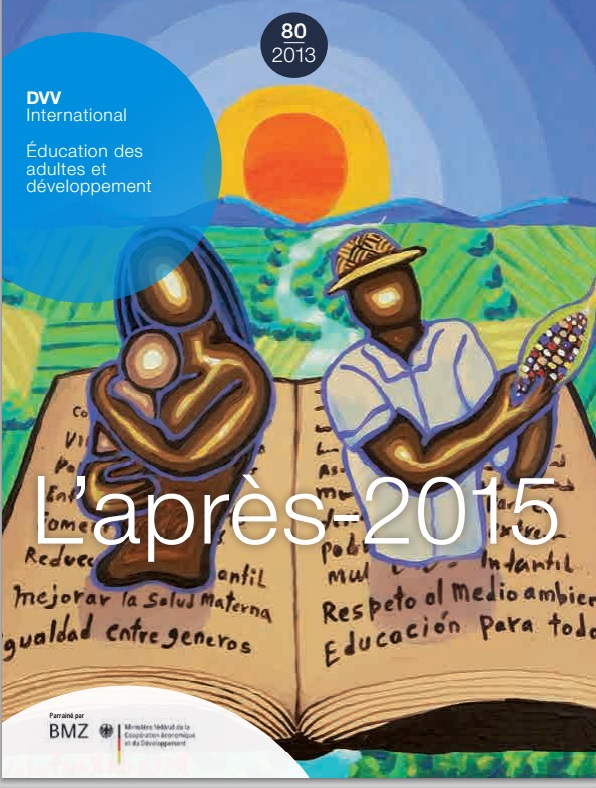 The debate on the definition of the post-2015 development objectives is entering a critical phase. According to the report of the meeting of the UNESCO Executive Committee held on 28 February, the World Education Forum, scheduled in Seoul in May 2015, is the occasion to adopt a common position before the final adoption of all the objectives at the UN Summit in September 2015.
The debate on the definition of the post-2015 development objectives is entering a critical phase. According to the report of the meeting of the UNESCO Executive Committee held on 28 February, the World Education Forum, scheduled in Seoul in May 2015, is the occasion to adopt a common position before the final adoption of all the objectives at the UN Summit in September 2015.
In such a context, and regardless of the appointments that are expected until then, the possibilities of improving the objectives are becoming increasingly limited. We believe that it is important to initiate a shift without delay, to start looking at the strategy for the post-2015 period, which will follow the adoption of the objectives.
A mixed picture of the progress in adult education
 The experience of consultations we conducted with formal and non-formal adult education networks in Quebec demonstrates concerns similar to those expressed around the world and which are summarized in the Second Global Report on Adult Learning and Education - GRALE by the UNESCO Institute for lifelong learning.
The experience of consultations we conducted with formal and non-formal adult education networks in Quebec demonstrates concerns similar to those expressed around the world and which are summarized in the Second Global Report on Adult Learning and Education - GRALE by the UNESCO Institute for lifelong learning.
Mrs. Bokova, Director-general of UNESCO, states in this report that the field of adult education tends to reduce to literacy or to training related to work in terms of policies and definitions of guidelines by governments around the world. She notes the lack of resources that undermines the development of local capacity. These findings are entirely consistent with a number of points raised also by the special issue "Adult Education and Development".
In Quebec, we find that the diversity of training needs of adult populations and their paths emerge strongly. We also note the significant diversification of background and training locations, paths, modes and forms of learning, systems and levels of education, tools and stakeholder organizations, including those from cultural organizations. In short, we conclude that it is a waste of time to try to determine a simplified strategic perspective.
Subscribing to a broader vision in order to promote the full exercise of citizenship
The enhancement of lifelong learning requires a much broader and inclusive vision than that emerging from the results observed in the assessment by the UNESCO Institute. Reading in "Adult Education and Development" under the pen name Mrs. King, representative of the World Bank, that the priority of the intervention of such an international institution boils down to early childhood is very worrisome.
Any practical experience must move away from these simplistic perspectives! Methods command intersectoral approaches and partnerships between networks and social actors. What encourages us in our commitment to the right to education for all is not the level of scholarship that an individual may acquire, but a prospect of developing a more just world with a full exercise of citizenship and the rights of the entire population.
The basis of our commitment aims for the empowerment of peoples and the improvement of individual and collective living conditions of the greatest number of people in the world. In a context of growing social stress, given the impacts of environmental change, the challenges of social justice intersect, more than ever, the path of action in favor of the right to education for all.
Being prepared to act after 2015
 We must prevent the international movement on adult education from focusing only on the post-2015 development objectives plan and from reducing its perspective to the vision of international institutions. If the time frame in May 2015 is a decisive moment of conclusion of the work, the adult education movement must now begin to define the perspective of its action beyond 2015. This requires defining the political action of social movements in the States and in the field.
We must prevent the international movement on adult education from focusing only on the post-2015 development objectives plan and from reducing its perspective to the vision of international institutions. If the time frame in May 2015 is a decisive moment of conclusion of the work, the adult education movement must now begin to define the perspective of its action beyond 2015. This requires defining the political action of social movements in the States and in the field.
Whatever the definitions used about development objectives, the challenge for the development of a culture of learning for all remains dependent on post-2015 mobilizations in different social occurrences. From this point of view, it's not so much to internalize targets set by the UN, but to locate the strategy to develop an action aimed at social transformation within states. The idea is to develop a perspective to act on the power relations internal to the different nations.
Collaboration between different social actors must be based on the development of claims to governments, likely to contribute to change this power relations. It is a question of moving beyond a minimalist vision of targets that will not be, indeed, easier to achieve. It is much more to develop a political battle that focuses on outcome indicators!
Like David Archer, the question of financing policies remains a critical issue that expresses the political will to recognize the importance of learning for all. We know that the distribution of wealth through progressive taxation is based on power relations in society. We believe that the conditions are given to initiate a movement capable of taking a stronger position on both public and political scenes on this plan in each of the social occurrences. The international cooperation that we need is really about establishing a common and shared will to act at the political level in favor of greater social justice.


